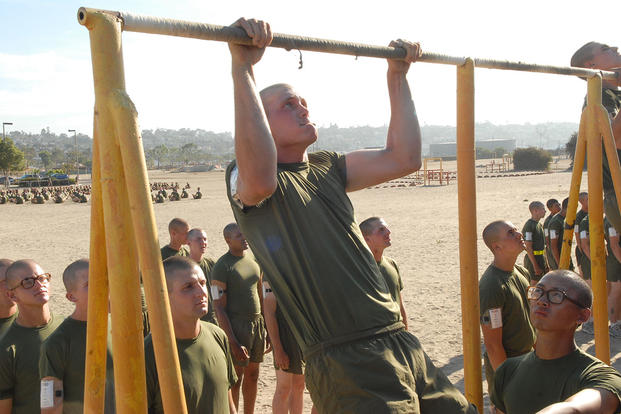After overhauling its fitness program earlier this year, the Marine Corps is making two new changes aimed at making it easier for troops to score as high as possible on annual fitness evaluations.
In a bulletin published this month, the service announced Marines would be able to retake the physical fitness test and combat fitness test if they receive passing scores but believe they can score higher. There is no limit on the number of retakes, according to the bulletin, though Marines must retake the tests according to their units established PFT/CFT schedule.
In another change, the new order allows Marines age 46 and older to do five kilometers of rowing on a rowing machine instead of three miles of running on a PFT, an acknowledgement of the impact and orthopedic issues that sometimes make running more difficult with age.
Both of these changes are complementary to the Corps' overall fitness goals of making Marines more lethal and resilient on the battlefield, said Brian McGuire, head of the force fitness branch within the standards division of Marine Corps Training and Education Command.
If a Marine fails the PFT or CFT, McGuire said, those results will have consequences, including an adverse fitness report, that will not be erased by repeat tests. Additional PFTs and CFTs taking within the testing timeframe, will not replace the one that was failed, he said.
But as the Marine Corps places more emphasis on fitness achievements as qualifications for numerous ground combat jobs, Marines will have more opportunities to try for an optimal score.
"If a Marine takes a test and [the score is] lower than what the Marine felt they could do, they can take the test over multiple times in accordance with the PFT schedules of the unit to which the Marine is assigned," McGuire said.
McGuire said the decision to allow Marines to retake the test is unconnected to another move announced earlier this summer, in which the service did away with the flexed-arm hang option for women on the PFT, offering push-ups or pull-ups instead.
Marines can only earn maximum points on the PFT by completing pull-ups, a challenging upper body exercise historically more difficult for women than for men. In 2013, the Marine Corps found that only 45 percent of female recruits in boot camp could do three pull-ups. According to the new scoring system introduced this summer, female Marines will need to do between seven and ten pull-ups to max that portion of the test.
"The scores, while being consequential, play a big part in a number of personnel management actions," McGuire said.
The decision to implement rowing as a substitute exercise for older Marines was made at the request of Commandant Gen. Robert Neller, who asked experts to come up with an alternative similar to running in energy output. The standards division considered walking, elliptical, cycling, and swimming, McGuire said, but ultimately determined that rowing was most similar to running in energy demand.
Marines will be required to use a Concept 2 rowing ergometer, a piece of equipment available through the Corps' Semper Fit program at most installations, he said. It's possible some locations and installations will have to buy the ergometer to meet the new requirements.
In the wake of all these changes, McGuire said the Marine Corps plans to revisit standards periodically to look for improvements. The force fitness branch has also created a new email address, tecom.forcefitness@usmc.mil, where they're asking Marines to submit their own ideas to improve the Corps' fitness program.
-- Hope Hodge Seck can be reached at hope.seck@military.com. Follow her on Twitter at @HopeSeck.
Related Video:



























